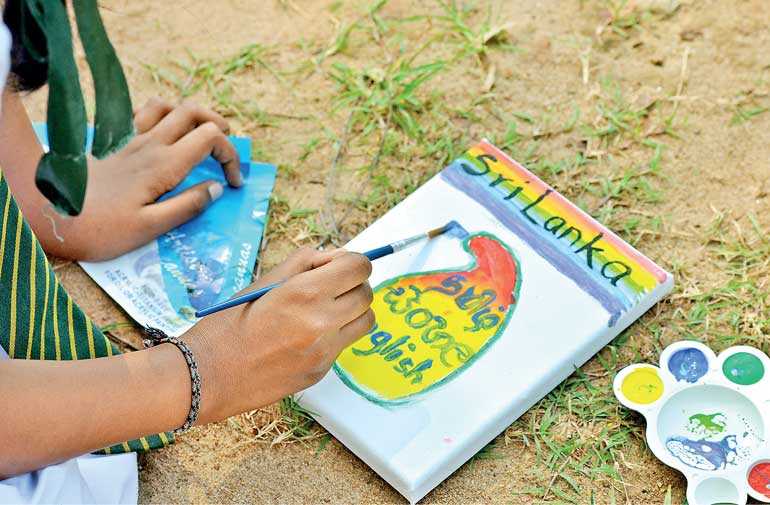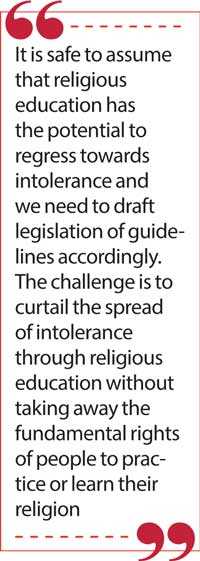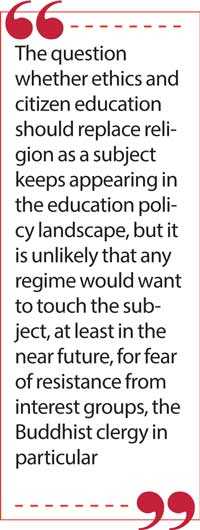Thursday Feb 19, 2026
Thursday Feb 19, 2026
Friday, 31 May 2019 00:00 - - {{hitsCtrl.values.hits}}

After the evil Easter attack of 2019 by terrorists claiming to be Islamists, spotlight is on Islamic religious education in ‘madrasas’ and Islam-based higher education. 
The decision to bring the proposed Batticaloa University College, feared to be a Sharia College, under the purview of the Ministry of Higher Education and the University Grants Commission is correct, but it begs the question why this was not done in the first place. The disarray in post-secondary education in Sri Lanka is a topic for another column.
As for religious education in other settings, conflicting measures are proposed. The Ministry of Muslim Religious and Cultural Affairs has submitted a draft Act to regulate madrasas. The Prime Minister recently spoke of bringing the madrasas under the Ministry of Education and have their curricula developed by the National Institute of Education (NIE). But what exactly is meant by a madrasa in the Sri Lankan context is not articulated.
Muslim Religious and Cultural Affairs Director M.R.M. Malik has said that there are 1,669 Islam ‘madrasa’ schools and 317 Arabic schools registered under the Department of Muslim Religious and Cultural Affairs all over the country. How many of these are informal ‘Sunday schools’ and how many are full-time schools for the training for priesthood. What is the extent of oversight on them?
We have four main religions in this country – Buddhism, Hinduism, Islam and Christianity – not counting various denominations in each. Religion is taught in three different settings – (a) as a subject in school (b) outside of school in ‘Sunday schools’ and (c) training for priesthood.
Any new legislation should take into account the full scope of religious education in this country and be guided by the fundamental rights and limitations to such fundamental rights that are already specified in the Constitution, and should not target any one religion unfairly.
Elements of intolerance in every religion
The faithful of each religion would argue that their particular religion preaches a message of love and peace. While passages from Quran are often quoted to depict Islam as an intolerant or even a violent religion, some argue that the Bible has as many messages of intolerance as the Quran. The Buddhist scriptures have no room for hate or denigration of women, but Buddhism as practiced in Sri Lanka is ripe with discrimination by caste, race and gender. 
All in all, it is safe to assume that religious education has the potential to regress towards intolerance and we need to draft legislation of guidelines accordingly. The challenge is to curtail the spread of intolerance through religious education without taking away the fundamental rights of people to practice or learn their religion.
The Constitution
as a guide
towards tolerance
The right to practice one’s religion or manifest ones beliefs is guaranteed in Sri Lanka by Article 14(e) as, “Every citizen is entitled to the freedom, either by himself or in association with others, and either in public or in private, to manifest his religion or belief in worship, observance, practice and teaching.”
This right is however tempered by Article 15(7) which states: “The exercise and operation of all the fundamental rights declared and recognised by Articles 12, 13(1), 13(2) and 14 shall be subject to such restrictions as may be prescribed by law in the interests of national security, public order and the protection of public health or morality, or for the purpose of securing due recognition and respect for the rights and freedoms of others, or of meeting the just requirements of the general welfare of a democratic society”.
Taken together, these two clauses give a guiding principle for religious education in Sri Lanka, I believe.
A recent publication by Philosophy of Education Society of Great Britain further expands and articulates these principles by bringing together the interests of parents and society as well as the interests of the children, as follows:
“Parents’ freedom to educate their children as they prefer should be constrained by (i) children’s interest in receiving their fair share of educational goods, and (ii) the wider society’s interest in the cultivation of educational goods such as democratic competence, tolerance and mutual respect (Philosophy of Education Society of Great Britain, 2018).”
This articulation is also consistent with the national objectives of education identified by the National Education Commission of Sri Lanka in 1992 where the first three out of the eight national objectives embody principles of democratic competence, tolerance and mutual respect.
Religion as a subject in schools
Religion is a compulsory subject at school from Years 1-12 and is one of the core subjects compulsory for all children sitting for the GCE (O/L). The curricula for all four religions are developed by NIE and delivered by trained teachers. Most children also spend time in religious education classes outside of the school at least one-half a day a week, typically on Sundays, hence called ‘Sunday Schools’ as a catchall phrase.
The question whether ethics and citizen education should replace religion as a subject keeps appearing in the education policy landscape, but it is unlikely that any regime would want to touch the subject, at least in the near future, for fear of resistance from interest groups, the Buddhist clergy in particular.
Religion in ‘Sunday Schools’
The Vajirarama Temple of Colombo gives a useful distinction between religion taught in school and outside of school. They say that while schools teach facts of religion, Sunday schools are more about the practice of religion. However, by the school’s own admission, training students for  examinations conducted by the Ministry of Buddha Sasana takes pride of place in the Daham Pasalas.
examinations conducted by the Ministry of Buddha Sasana takes pride of place in the Daham Pasalas.
The concern today is the content of what is taught behind the doors in those schools, the Islamic schools in particular, but heavy-handed regulation of Sunday schools would be unwise and impractical.
Currently, the curricula for these schools are set by non-governmental religious bodies. In the case of Daham Pasals, the entity is the Young Men’s Buddhists Association (or YMBA) for historical reasons. In Christian schools, each church establishment is in charge. Similarly, a mainstream Islamic organisation should be in charge of the curricula for Islamic Sunday schools, with all religious organisations mandated to abide by guiding principles to be declared by the Ministry of Education. Taking Sunday schools under the charge of the Ministry of Education and the NIE would over burden these institutions.
Schools for training in religion
Sri Lanka has a tradition of schools for the instruction of the Bhikkus since the arrival of Buddhism in Sri Lanka in the 3rd Century BC. The Pirivena Education Act of 1979 formalised this system of preparation for Bhikkus. There are seminaries managed by various denominations of Christianity, but not much is known about preparation of Moulavis or Islamic priests.
Before a new Act to formalise Madrasas is enacted, it would be wise to survey the landscape of religious education in Sri Lanka, and as a first step, bring them all under a common guiding principle that their teachings abide by democratic values embodied in our Constitution.
Open data system of registered religious institution
This day and age where technology allows the availability of large amounts of information over the internet, the transparency afforded by such openness should be exploited to the maximum. The Muslim Affairs Ministry gives a list of various registration processes including the processes for registration of Mosques, Arabic Colleges, Ahadiyya (Dhaham) Schools, Hiflul Quran Madrasa, Islamic Associations Islamic Pre Schools and Islamic Priests (Moulavi).
If the listed institutions and individuals can be made publicly available, concerned public can be more vigilant on unauthorised institutions or individuals, or those that departure from guiding principles of religious education.